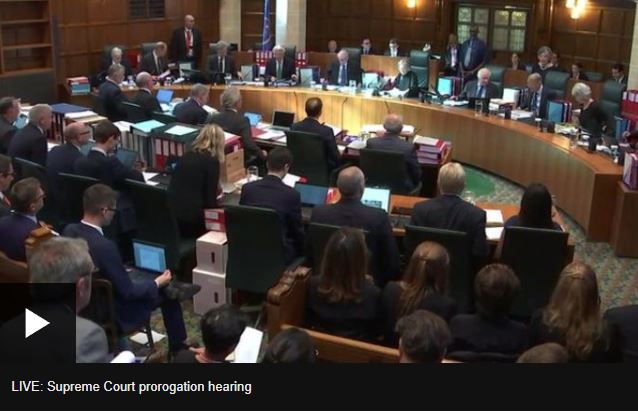Supreme Court examines lawfulness of Parliament suspension

Supreme Court examines lawfulness of Parliament suspension
The Supreme Court is meeting to consider whether Boris Johnson acted lawfully in suspending Parliament. The 11 judges will hear two appeals relating to the PM’s decision to prorogue Parliament to mid-October.
Edinburgh’s Court of Session found last week that the shutdown was unlawful and “of no effect” but London’s High Court said it was not a court matter.
The prime minister says he will “wait and see what the judges say” before deciding whether to recall Parliament.
For the next three days, the Supreme Court in London will hear evidence from the government and campaigners challenging the decision to suspend Parliament.
The suspension of Parliament, a process known as proroguing, began a week ago.
MPs are not scheduled to return until 14 October, when there will be a Queen’s Speech outlining Mr Johnson’s legislative plans.
Opposition parties have called for Parliament to be recalled.
Speaking to BBC political editor Laura Kuenssberg ahead of the start of the court case, Mr Johnson said he had the “greatest respect for the judiciary”, and its independence “is one of the glories of the UK”.
“And I think the best thing I can say, having said that, is to wait and see what they say,” he said.
Asked again if he would be ready to recall Parliament if that was what the Supreme Court said he ought to do, he said: “I think the best thing I could do is wait and see what the judges say.”
Justice Secretary Robert Buckland told BBC Radio 4’s Today programme that whatever the Supreme Court’s decision, the “robust independence of our judiciary” must be respected.
The government had a duty to study the “precise wording” of the court’s ruling before deciding what to do.
But he said suggestions Parliament had been sidelined “had not been borne out by events” as it had passed “significant” legislation curbing the PM’s room for manoeuvre.
Scotland’s highest civil court, the Court of Session, last week found in favour of a cross-party group of politicians who were challenging the prime minister’s move and ruled that Mr Johnson’s suspension of Parliament was unlawful.
The judges said the PM was attempting to prevent Parliament holding the government to account ahead of Brexit.
They were unanimous in finding that Mr Johnson was motivated by the “improper purpose of stymieing Parliament”, and that he had effectively misled the Queen in advising her to suspend Parliament.
Following the ruling, business minister Kwasi Kwarteng said: “many people” believe judges are biased about Brexit – comments that prompted criticism and led to the prime minister defending the independence of the judiciary.
The judgement at the Court of Session came after London’s High Court heard a case brought by businesswoman Gina Miller, who argued the shutdown of Parliament was “an unlawful abuse of power”.
The judges said they rejected her claim because the suspension of Parliament was a “purely political” move and was therefore “not a matter for the courts”.

Read Also –
Source – https://www.bbc.co.uk






